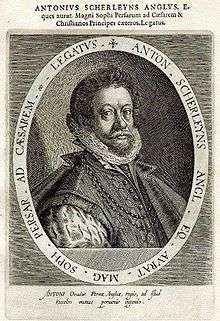Anthony Shirley

Sir Anthony Shirley (or Sherley) (1565–1635) was an English traveller, whose imprisonment in 1603 by King James I caused the English House of Commons to assert one of its privileges—freedom of its members from arrest—in a document known as The Form of Apology and Satisfaction.
Family
Anthony Shirley was the second son of Sir Thomas Shirley of Wiston, Sussex, and Anne Kempe, the daughter of Sir Thomas Kempe (d. 7 March 1591) of Olantigh in Wye, Kent. He had an elder brother, Sir Thomas Shirley, and a younger brother, Sir Robert Shirley, and six sisters who survived infancy.[1][2][3][4]
Career
Educated at the University of Oxford, Shirley gained military experience with the English troops in the Netherlands and during an expedition to Normandy in 1591 under Robert Devereux, 2nd Earl of Essex, who was related to his wife, Frances Vernon; about this time he was knighted by Henry of Navarre (Henry IV of France), an event which brought upon him the displeasure of his own sovereign and a short imprisonment.
In 1596, he conducted a predatory expedition along the western coast of Africa and then across to Central America, but owing to a mutiny he returned to London with a single ship in 1597. In 1598, he led a few English volunteers to Italy to take part in a dispute over the possession of Ferrara; this, however, had been accommodated when he reached Venice, and he decided to journey to Persia with the twofold object of promoting trade between England and Persia and of stirring up the Persians against the Turks. He obtained money at Constantinople and at Aleppo, and was very well received by the Shah, Abbas the Great, who made him a Mirza, or prince, and granted certain trading and other rights to all Christian merchants.
Then, as the Shah's representative, he returned to Europe and visited Moscow, Prague, Rome, and other cities, but the English government would not allow him to return to his own country. Two members of his expedition returned to London, where they published the anonymous pamphlet The True Report of Sir Anthony Shirley's Journey, which, additionally spurred by the actor Will Kempe's meeting with Sir Anthony in Rome, evoked two references to "the Sophy"— the Shah— in Shakespeare's Twelfth Night (1601–02).[5]
For some time he was in prison in Venice, and in 1605, he went to Prague and was sent by Rudolph II, Holy Roman Emperor on a mission to Morocco; afterwards he went to Lisbon and to Madrid, where he was welcomed very warmly. The King of Spain appointed him the admiral of a fleet which was to serve in the Levant, but the only result of his extensive preparations was an unsuccessful expedition against the island of Mitylene. After this he was deprived of his command. Shirley, who was a count of the Holy Roman Empire, died at Madrid some time after 1635.
Shirley wrote an account of his adventures, Sir Anthony Sherley: his Relation of his Travels into Persia (1613), the original manuscript of which is in the Bodleian Library at Oxford. There are in existence five or more accounts of Shirley's adventures in Persia, and the account of his expedition in 1596 is published in Richard Hakluyt's Voyages and Discoveries (1809-1812). See also The Three Brothers; Travels and Adventures of Sir Anthony, Sir Robert and Sir Thomas Sherley in Persia, Russia, Turkey and Spain (London, 1825); EP Shirley, The Sherley Brothers (1848), and the same writer's Stemmata Shirleiana (1841, again 1873).
See also
Notes
- ↑ Pennington 2004.
- ↑ Raiswell I 2004.
- ↑ Raiswell II 2004.
- ↑ Raiswell III 2004.
- ↑ Molly Maureen Mahood, "Introduction" Twelfth Night (Penguin Classics), p. 21.
References
- Pennington, Janet (2004). "Sherley, Sir Thomas (c.1542–1612)". Oxford Dictionary of National Biography (online ed.). Oxford University Press. doi:10.1093/ref:odnb/25435. (Subscription or UK public library membership required.)
- Raiswell, Richard (2004). "Sherley, Sir Thomas (1564–1633/4)". Oxford Dictionary of National Biography (online ed.). Oxford University Press. doi:10.1093/ref:odnb/25436. (Subscription or UK public library membership required.)
- Raiswell, Richard (2004). "Sherley, Anthony, Count Sherley in the nobility of the Holy Roman empire (1565–1636?)". Oxford Dictionary of National Biography (online ed.). Oxford University Press. doi:10.1093/ref:odnb/25423. (Subscription or UK public library membership required.)
- Raiswell, Richard (2004). "Shirley, Sir Robert, Count Shirley in the papal nobility (c.1581–1628)". Oxford Dictionary of National Biography (online ed.). Oxford University Press. doi:10.1093/ref:odnb/25433. (Subscription or UK public library membership required.)
- Attribution
 This article incorporates text from a publication now in the public domain: Chisholm, Hugh, ed. (1911). "article name needed". Encyclopædia Britannica (11th ed.). Cambridge University Press.
This article incorporates text from a publication now in the public domain: Chisholm, Hugh, ed. (1911). "article name needed". Encyclopædia Britannica (11th ed.). Cambridge University Press.